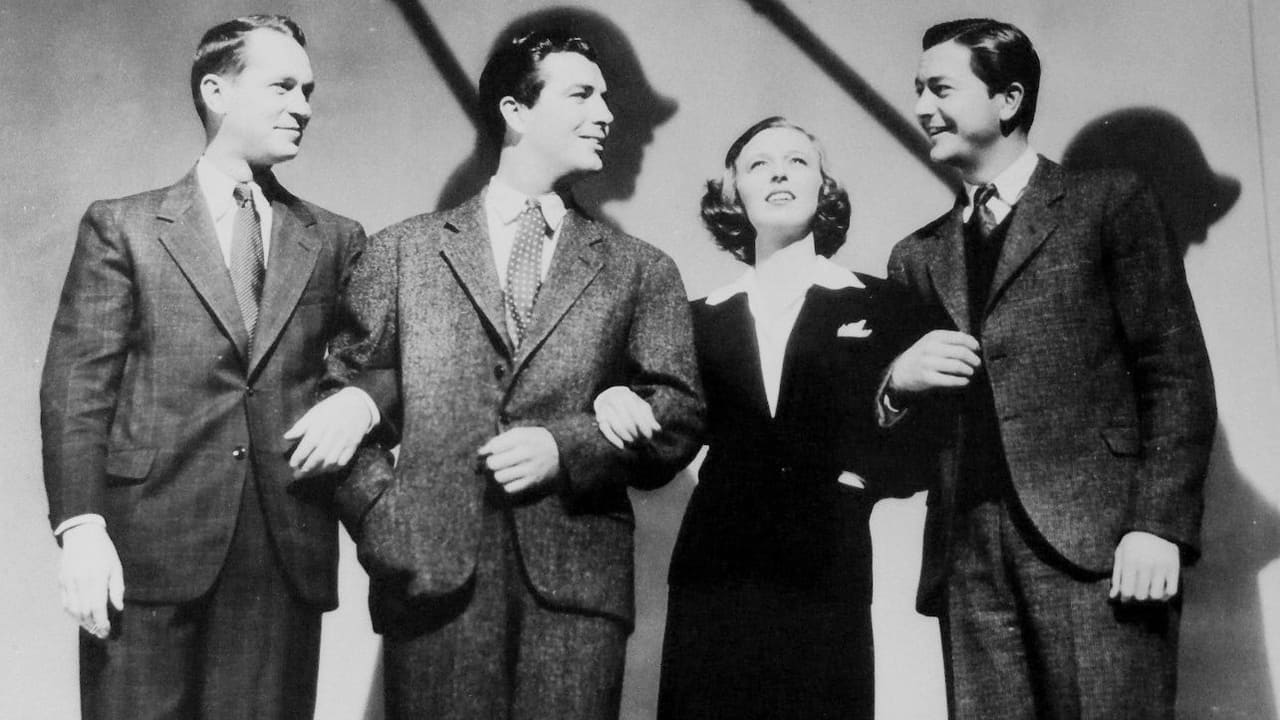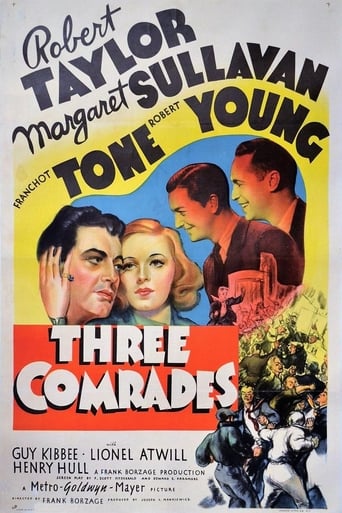



I like the storyline of this show,it attract me so much
View MorePeople are voting emotionally.
n my opinion it was a great movie with some interesting elements, even though having some plot holes and the ending probably was just too messy and crammed together, but still fun to watch and not your casual movie that is similar to all other ones.
View MoreAs somebody who had not heard any of this before, it became a curious phenomenon to sit and watch a film and slowly have the realities begin to click into place.
View More"Three Comrades" could be summed up as a sequel to "All Quiet on the Western Front". "Western Front" being about WWI from the German side (written by a German serviceman), this film starts with the day the war is over and three surviving airmen must get on with civilian life.Unfortunately, in comparison with the classic "All Quiet on the Western Front", "Three Comrades" is pretty bad. It has no "A" actors, it feels rushed through, and only the dialogue sparkles, the result of being written by F. Scott Fitzgerald. Margaret Sullavan's character in the film is to personify the health of Germany, with her health deteriorating as Germany deteriorates. The film is perceptive in diagnosing what will be the outcome of things from a 1938 perspective. But the film feels muddled nonetheless.An interesting sidenote: Eric Maria Remarque, who wrote the novels upon which both above mentioned films were based, had to leave Germany because of his views. Later, during the war, his sister was beheaded by the Nazis as punishment for Remarque, who they could not reach.
View MoreSpoilers. Observations. Opinions.Nazis are coming. German people are ticked off about the end of World War One. They are the losers in the world conflict. They need food, money and jobs. Soon, they will be led by a supposed savior, whom I call Uncle Adolph, who will later lead them into yet another war, World War Two. Adolph was a corporal in World War One.The film is vague about this. I thought the violent scenes are about communists, being after 1917 and all, but I realize that in post-World War One that some disgruntled German survivors get nasty about what they want. They are what later become the National Socialist Party.Robert Taylor, Robert Young and Franchot Tone have American voices, but are German war veterans. They are happy go lucky, and Taylor ends up marrying Margaret Sullavan, with the other two men as nice guy hangers on.Sullavan does a Camille and has consumption/TB. She goes to a sanitarium, gets an operation (paid for by her sugar daddy buying the three men's sports car) but still passes away.Sad but happy, this film. Robert Young also gets a demise, but arises to become Dr. Marcus Welby, M.D. and Father Knows Best.
View MoreI really didn't know what to expect from this film, and what I got was an excellent movie with one huge flaw. To really understand this film you have to put yourself in the place of a German citizen -- in Germany -- after World War I. Can you do that? I don't know the culture. I don't know the history. And that is a terrible handicap going into this film. And, for most of the film, it doesn't matter, because although it is supposedly taking place in German, it doesn't seem much different than some American setting might be. But then something comes along and you just feel out of place in the film. I actually think that a better way to have proceeded with this film, would have been to turn into into a story about returning WWI veterans, and it would have worked better for American audiences. And it may be this "feeling out of place-ness" that resulted in the film not being successful at the box office.Having said that, this is a great little story, and the acting is absolutely top-notch. And what I wish to focus on is the acting. I'm not a particular fan of Robert Taylor, kind of a take-him or leave-him attitude, and every once in a while I will see some film of his and think how really good he was. Ironically, he didn't want to do this film, and I think he's superb in it as the male lead. Similarly, there are few Margaret Sullavan films in which I really appreciate her (another is "The Mortal Storm")...but this is another. A wonderful performance. Franchot Tone was, in my view, an underrated actor, who once in a while really shined through. This is one such film for him, also. In later life, Robert Young was very dissatisfied with his film career (hence, "Father Knows Best"); he should have been satisfied with this role, and his portrayal of it is excellent. Guy Kibbee is in an unusual role as a tavern owner. I was never impressed with Lionel Atwill...and I'm still not. And Henry Hull...did he ever do anything in a film other than blow hot air????? It was interesting to see Monty Woolley as a medical specialist...not particularly good or bad...just interesting.So, I invited you to see this film and see if you feel comfortable as a member of the audience inside a culture and history of which you have no understanding. Aside from that, it's an excellent film.
View MoreHow does one not fall in love with Margaret Sullavan? The husky calm of her unique voice could invoke so many emotional inflections that combined with her will-o'-the-wisp beauty it's a shame she is not well remembered beyond her one indisputable classic, Ernst Lubitsch's "The Shop Around the Corner" (1940) with James Stewart. Take, for example, this 1938 romantic drama based on Erich Maria Remarque's ("All Quiet on the Western Front") 1936 novel with a screenplay co-written by none other than F. Scott Fitzgerald, his only screen credit. Not surprisingly, it's about the Lost Generation who came of age during World War I, and she elevates the movie into something quite magical as Patricia Hollmann, a beautiful aristocrat fallen on hard times and dying of tuberculosis. She becomes the center of gravity for three close war buddies eking out a living fixing cars and driving a cab in a pre-Hitler Germany torn asunder by unemployment and economic strife.The main focus of the story is on the unbridled love that develops between Patricia and Erich, the most openly naïve of the three and probably the most in need of purpose in his life. Just graduating from his glamour-boy phase swooning over Garbo in "Camille", Robert Taylor is no dramatic match for Sullavan but gives Erich enough sincerity to avoid embarrassment. Better are Robert Young as the headstrong Gottfried and especially Franchot Tone as wise Otto whose unconditional friendship is nearly as touching as the central romance. In the second of four collaborations with Sullavan, director Frank Borzage imbues the film with his trademark romanticism particularly lush in this handsome MGM production captured pretty well in the 2009 DVD. No surprise, the ending death scene may seem hackneyed by today's standards, but it compares favorably to Bette Davis's similarly heroic demise in "Dark Victory". This is well worth seeking out if only to rediscover Sullavan at her most radiant. She earned the New York Film Critics Award and an Oscar nomination and sadly made only 16 films in her career. Read her daughter Brooke Hayward's harrowing memoir, "Haywire", to find out why.
View More